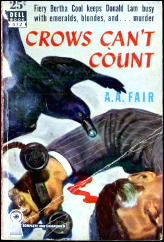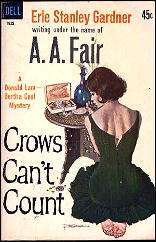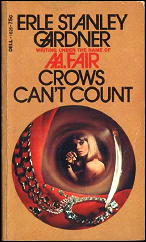Fri 25 Sep 2009
ERLE STANLEY GARDNER writing as A. A. FAIR – Crows Can’t Count.
William Morrow, hardcover, 1946. Paperback reprints include: Dell 472, mapback edition, 1950; Dell D373, McGinnis cover art, September 1960; Dell 1625, September 1972 (all shown).

Not one of the better books in the series of cases solved by the well-known amusing pair of private eye detective partners, Donald Lam and Bertha Cool, I wish I didn’t have to say. Bertha Cool is the humorous one, although she doesn’t intend to be, but in terms of figuring out who a killer is, she’s shrewd enough when it comes to money, but otherwise she’s not the brighter one of the pair.
No, that’s Donald Lam, who tells all of the stories, but he tells them so close to the vest that if a reader ever tried to figure out what he’s thinking and why, it would be like climbing a wet noodle fastened to a sky hook on the other end – the imaginary kind — and greased all the way up with the finest grade of cooking oil.
This one has something to do with emeralds, and a trust fund with two trustees and two beneficiaries, one male and one female, the latter of whom is very good looking and calls one of the trustees Uncle Harry but kisses him as though he weren’t a relative, which he isn’t, I don’t think. Donald Lam also gets in the way of the lady’s kisses too, so it isn’t as if she were playing favorites.

There is also something to do with a crow, and as crows tend to do, this one is attracted to bright shiny objects. This particular one, as the title also suggests, is not very good at math. But crows do what they do, and what they do makes sense, even to non-crows.
But I could not, while reading this book, figure out why the characters in it did such incomprehensible things, not including Donald Lam as one the characters, but since his reaction to such strange behavior was so minimal, I shrugged my shoulders (figuratively) and said that the author, Mr. Gardner, must have had a bad few weeks when he was working this one up.
Turns out, ha-ha on me, that the incomprehensible behavior (as far as I was concerned) was what tipped Donald Lam as to (eventually) what kind of scheme was going on. Here’s where Lam not having a Watson comes in. Bertha’s as much in the dark as to what was going on as I was, but at least I didn’t stand there sputtering and saying “Fry me for an oyster.”

I think in detective stories there should be some discussion going on between the would-be solvers of the mystery, to consider this possibility and then that, bringing up red herrings and false trails to make the tale more complicated with an wide array of suspects, means, and motives — and puzzling over them. Lam talks to no one in this book, and by the time he headed off to Columbia, the South American country, I’d given up on figuring out the case on my own as a lost cause.
That Bertha also ends up in Columbia is where a lot of the humor I mentioned above comes in. It’s hot, she doesn’t speak Spanish, and she’s been sold a bill of goods that would have been totally unnecessary if Lam had told what little he knew or guessed or had a hunch as to what was going on.
The case is essentially solved when on page 188 a giovernment offical for the country of Columbia named Ramon Jurado snaps his fingers, which he follows up on page 196 when he sends Lam a telegram consisting of a name and address, to which Lam goes and proceeds to the apartment of one of the players in the story to tell her exactly what had happened and when. That it takes 10 pages of small print to tell her tells you something about how complicated this story was, and it’s still not over – there is something like 15 more pages of explanation to go – but how on earth Lam did know all of this?
Other than what I’ve said so far, I have no idea.
September 26th, 2009 at 2:03 am
Honesty I don’t think I really read these for the mystery plots. I read them for the fun of watching Donald operate and get in and out of trouble. The mystery solution never really seemed the point, so much as a device so Donald could shine and Bertha be her crotchety self. They often seemed overly complex because the more complex and convoluted they were the faster Donald had to talk and think.
I don’t think Gardner gave a fig for the fair play part of the game.
Granted some of the plots are better than others, but over all the appeal for me was Donald’s fast talking and fast thinking. And to be honest that was a lot of the appeal of Perry Mason too. Not the actual mystery, but how he operated.
With Donald it was the fun of seeing the lamb turn on the wolves, while with Perry it was seeing the individual take on and defeat the system, but I can’t say I read either series for the mystery plots, though Gardner could do them perfectly well when he wanted.
In that sense I think Gardner, Spillane, Fleming, Leslie Charteris, and John D. Macdonald wrote books that were as much fable as mystery. I’m not sure the plot or the puzzle was ever the point in their work as it was in Christie, Sayers, or Queen. I think at times we are doing them a diservice when we compare them to writers whose goals were so different.
I have a feeling reading a Donald Lam book looking for a fair play mystery is somehow missing the point.
September 26th, 2009 at 10:09 am
Lovely reply.
Stout uses the device of Wolfe keeping things from Archie for various questionable reasons. I have read (or listened to) every Wolfe novel at least three times, and I almost never remember who did it. The mystery serves as this thread to pull you through the book, but all you really care about is watching Archie and Wolfe. Lam and Cool seem much the same, though I’ve read only a few of those novels, though I hope to remedy that, since I read every Mason by Gardner.
September 26th, 2009 at 11:12 am
I think you’re right, Max. Stout also wasn’t an author whose major intent was to play fair with his readers. Who actually “did it” wasn’t a major issue in his mysteries and you can read them over and over again and get the same amount of enjoyment from them.
On the other hand, if you (the reader) can’t keep up with Wolfe’s detective abilities, his actual train of thought makes sense in the end. (Or that Stout does a fine enough job in this regard that it seems to.)
Even if Wolfe is awfully obscure in what he does along the way, including withholding things from Archie, all is revealed in the end.
And Archie’s puzzlement is as much ours, as we get to mull things over along with him. That neither he nor we have all the facts doesn’t seem to matter.
So to reply to David, the lack of “fair play” wasn’t exactly what I was unhappy about in CROWS CAN’T COUNT. It’s simply that there’s next to no explanation of how Lam learns everything he does and when he learned it — or even how he could have learned it. There are little bits and pieces here and there, but that’s all.
September 27th, 2009 at 3:15 am
Steve
Your points about Wolfe and Lam (now there’s a detective agency name for you) are well taken, but again, I don’t think it ever bothered me if Donald made some leaps of logic in getting to the solution since that wasn’t really why I was reading them.
I love Simenon and Maigret, but I admit I can be halfway through a Maigret novel before I remember I have read it before, and even in some of the books I’ve read several times the killer’ idenity doesn’t really stick with me.
But what does stick is the pleasure of Maigret’s company, a glass of Calvados, a bottle of Pernod, the way Maigret always seems to always have on too heavy a coat in some overheated apartment, the way Paris seems in the rain, those surprising moments when the slow and careful Maigret shows a touch of violence or anger when a suspect is ruining his own life.
Odd as it may be to say, in a genre that is built around puzzles and plots and who-dunnit, some of the most entertaining works don’t always offer much in that department, but they do offer us a world we enjoy visiting and returning to — and people whose company we like to keep.
With some writers the crime and mystery and detective element are just an excuse to spend a few hours with a clever friend, even if sometimes you might admit that things could have held together a bit better if a little more effort had been made toward the detective element.
I don’t think I ever came away from a Lam and Cool exploit impressed by the clever plot or solution — I just came away with a smile at the fun I had along the way.
September 27th, 2009 at 10:57 pm
I’d say that the plot of CROWS CAN’T COUNT is impressive enough that it’s one that I’m going to remember for a while.
And after thinking about it last night, I’d even go go far as to say that it has too much plot. A lot of things went on in the dead man’s office that day, some of which contributed to his murder and some of which didn’t.
There are also a lot of possible suspects, all acting as guilty as anything, and many of them are. Guilty, that is, of something, but not necessarily the murder.
So as I said, too much plot, and not enough connective tissue in the solution, or the working out thereof.
Gardner’s always been one of my favorite writers — over 50 years now — and when I said in the first sentence of my review that I didn’t think that this one is one of the better ones in the series, I meant it when I later added, “I wish I didn’t have to say [it].”
September 28th, 2009 at 12:55 am
Steve
How any of us feel about a book is how we feel about it, and I’m certainly not arguing that. I will admit my first reading of the article left an impression you thought it should have been more fair play, but I see that isn’t what you meant.
To clarify my point the complex plots of Gardner’s books and the fact that all the little twists and turns don’t always pay off were a minor issue for me, even in this one. I was reading more for the company of Mason and Lam than the plot.
All I am saying is why what bothered you in this one didn’t bother me. Horse of another color and all that. Neither of us is wrong and both are right — from different takes on the same thing. Your point is a valid criticism, my point is it didn’t effect my enjoyment of the book.
Considering Gardner used to dictate three or four books at a time (plus articles on everything from law to hunting and fishing) it’s a wonder he holds together as well as he does. In 1946 he was doing at least three series — Mason, Lam and Cool, and Doug Selby.
Supposedly his secretaries used to hope they took the dictation for the book they started on with him so they could see how it ended.
I just wanted to see what kind of fast talking Mason or Lam were going to do when the heat was on. I’ll confess while reading them some of my more critical facilities were turned off in ways they might not have been with other series and writers. Like popcorn I prefer the cheap movie theater variety to the gourmet kind. These were literary popcorn.
I agree, that Stout was more careful on this count in following Wolfe’s logic, but he was playing a slightly different game than Gardner, or at least another variation on it. For me both men succeeded at what they meant to do most of the time — even in this one.
February 4th, 2010 at 11:11 pm
[…] Crows Can’t Count (by Steve Lewis) Owls Don’t Blink (by Marcia Muller) Kept Women Can’t Quit (by Steve Lewis) […]